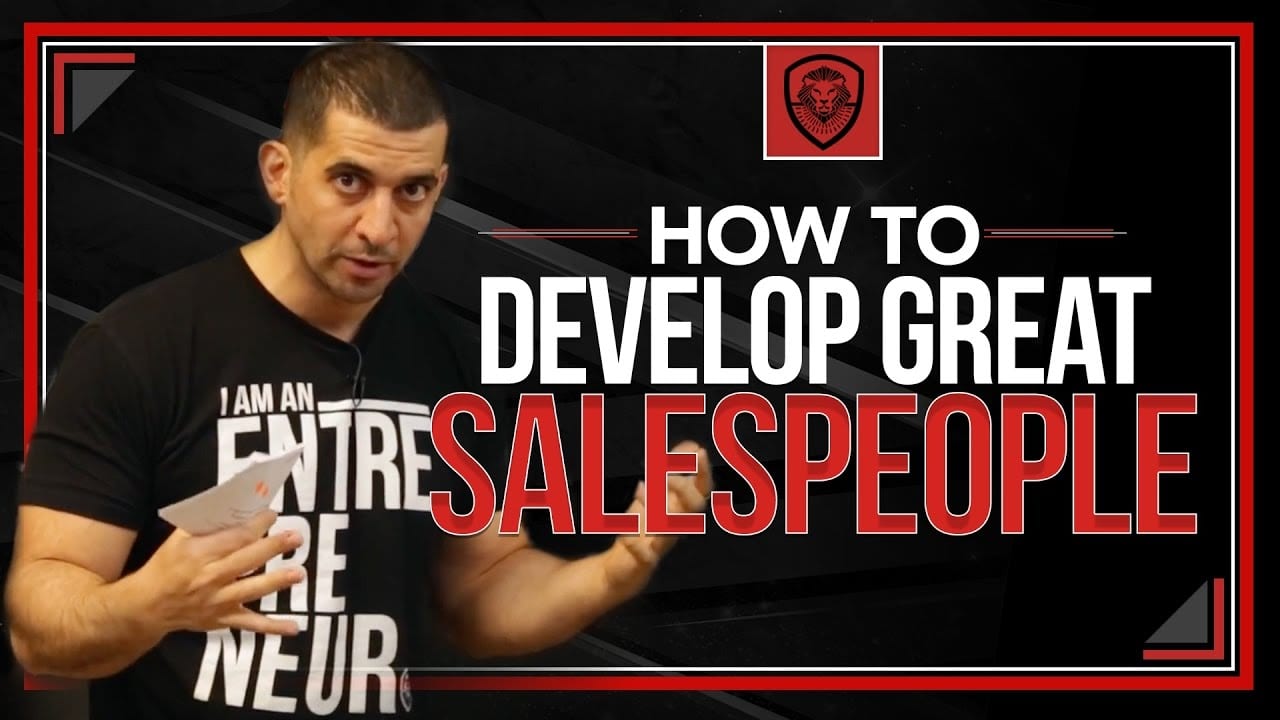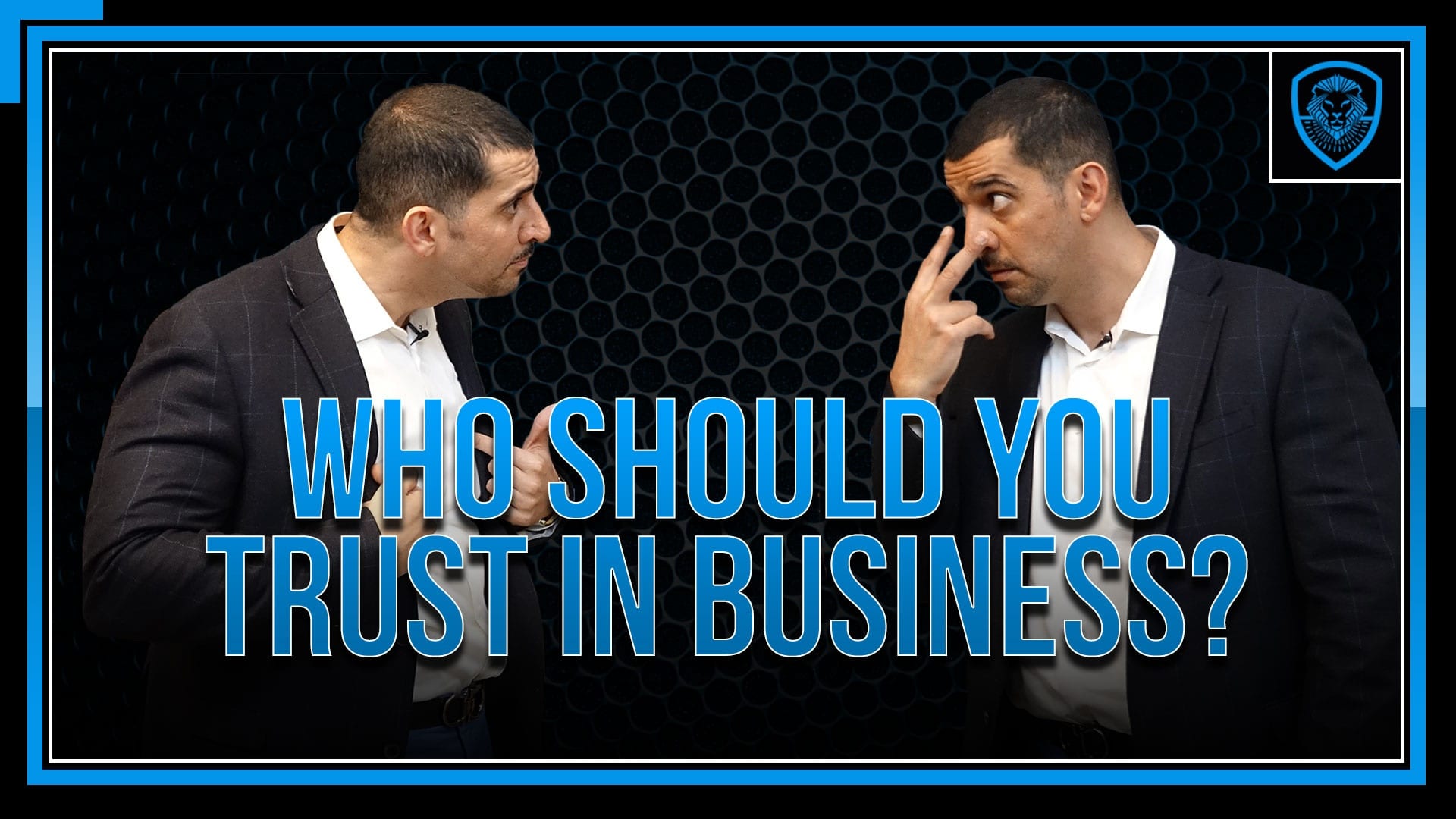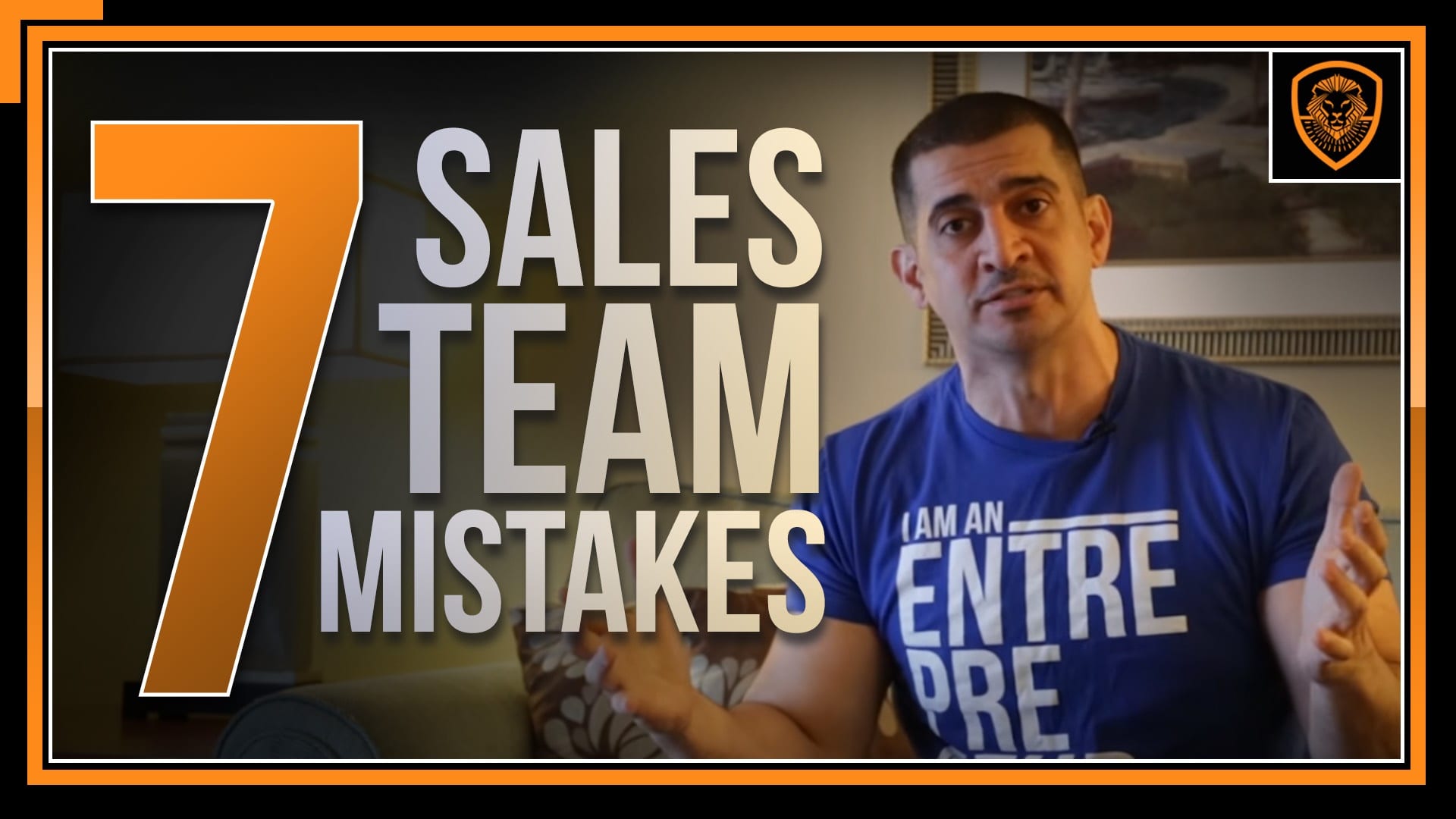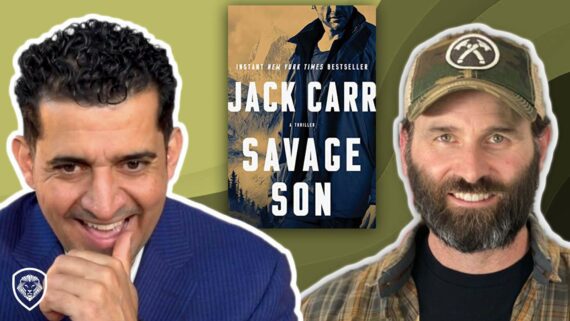I want you to think about two different real estate companies. One has been flat in their sales for five years straight. The other one beats their prior best in sales, year after year. There are a lot of metrics people use to explain this, but there’s one thing that’s definite. The one that beats their prior best in sales year after year does a better job developing salespeople. So in today’s video, I give you 11 steps on what to do to develop great salespeople with your company. Prior to me getting into this, I need you to watch the following two episodes as well: • Six Reasons Why You’re Not Selling More • Customer Service vs. Customer Experience I’m not going to cover the points in those videos here since I already have, but both are needed, so be sure to watch them. Now let’s get right into it.
How to Develop Great Salespeople
#1:Have a Clear Recruiting Philosophy
The first step is very simple, but most people don't do it. When I ask somebody what they're looking for in a partner, a boyfriend, girlfriend, husband or wife, most people don't even know what they're looking for. And yet they want to find the love of their life. It's the exact same thing when somebody tells me their sales are flat. I ask them the simple question, "Tell me what an ideal sales person in your company looks like." And they say, "Uh, hardworking, uh, great attitude." If you say, uh, uh, too many times, you don't know what you're looking for. It's got to be very simple. Take out a paper and pen and write down exactly what the ideal sales person looks like in your company. You may say, "But I don't know what that is." Pick the best sales person in your industry. What does he or she do? That's the type of person you want. Go look for people like that.
Salespeople for $40 Perfume vs $5 Million Jets
Let me give you an example. If my product is $40 bottles of cologne or perfume that are sold on the streets, I can have an 18-year-old kid selling it. That doesn't require a 43-year-old person with a degree. But if I'm selling private jets that are $5 million and up, I need somebody a little bit more sophisticated.
Season Tickets to the Dallas Cowboys
Now what if I'm selling season tickets to Dallas Cowboys or Lakers games, guess what I need. The salespeople I hire for that need to know a lot about sports. They need to be fans. They need to love the Dodgers, Lakers, Cowboys, or whatever it is. No matter the product, find out what the ideal person looks like for your product. Yours may be that they don't even need to see people face-to-face because they sell over the phone. Perfect. What kind of a voice are you looking for? What type of attitude are you looking for? What's the tonality?
Some of the qualities I look for are very simple.
• Audacity • Coachability • Competitiveness
And then obviously, you're not really going to know anything about work ethic unless you call references and until you've worked with them for 30, 60, or 90 days.
#2: Start the Day Strong
If a sales leader doesn't know how to get everybody started strong early in the morning, the day starts off on a bad note. Think about how most people start their day. They get into an argument with their spouse, boyfriend, or girlfriend. They get stuck in traffic, or something else doesn't go right in the morning. Then they come to work, and they're already not in the mood. You need to figure out a way to start their day better. For example, an audio, strong text, a motivational message. Whatever it is, you have to figure out a way to start all the salespeople on a strong note on a daily basis.
Recommended for You:
#3: Have a Playbook with Scripts and FAQs
Point number three is to have a playbook with scripts and FAQs. Let me explain. A lot of people say, "I have my own way of selling things." No problem. I want you to add your personality to it, but I need a skeleton. Just like with the human body, we all have the same skeleton, but we all look different. Why? Some of our bones are longer or taller or thicker. Others are skinny. Some are endomorph, ectomorph, mesomorph, but regardless, we have the same skeleton. Then you pack on the muscles, skin, the hair, the nose, and all the other stuff that makes all of us unique. The skeleton is the structure of the sales process you have in your company. Let people add the muscles, which is their personality, to the sales process. So make sure you have a playbook with scripts, and everything in there that tells them what do when people say things like, "I want to think about it." Have all those things in a manual so that a self-motivated, hardworking sales person can learn for themselves.
#4: Most Effective Training in Order
Listen in here for the most effective training order.
#5: The Guarantee of Sales
Next, is a skill alone that guarantees that this person is going to make it in sales. Too many times people teach this too late. It's purely discipline, and I always like to teach the discipline of this early. And here's what it is. Follow up. If you, and the sales people you train master the art of follow up early, you pretty much guarantee success. Do you realize that you, as a sales person or somebody that's developing other sales people - if you master the art of follow up early, you pretty much guarantee success. Here's why. There are two things. First, with follow up, you grow your pipeline of customers to sell. If I have 100 people to follow up with, maybe only two buy. When I have 200, now ten buy. I keep adding to my pipeline, and it keeps getting bigger because I teach the discipline of follow up to my sales people. Everybody's following up, and sales keep going higher. Most of the time people don't teach follow up. When someone says no, instead of following up, they say, "Oh, this person's not interested. Next. Oh, this person's not interested. Next." You hear people say, "Some will, some won't, so what. Next." Yes, that's true. But things change. Conditions change. I've called a client back six months later, and found they had a death in the family, and got $600,000 from a death benefit that they received from a life insurance policy. And because I followed up, we were able to help that person out. I've called people back that didn't want to do business, but they were okay with me following up every 90 days. Because I followed up, two and a half years later, they did business with me.
Another Reason Follow Up is Important
Here's another reason why follow up is so important. When someone follows up with me for two, three, four years, guess how I see this person? I see them as a pro. I like to do business with people that are professional. And here's what I know. Most people won't even stick around for two years in sales. The person that's still selling four years later? I'm doing business with them, because they're a pro. This is why the discipline of follow up needs to be done very, very early.
#6: Constantly Measure Your Sales People's Progress
Next, constantly measure the progress of your sales people. This is an element of accountability. And when I say constantly, I mean daily, then weekly, then monthly, then quarterly, and then annually. When I run a sales office, what I like to do is that I touch anybody that's in that sales office on a daily basis. I get their activity on a daily basis. On a weekly basis we do accountability with everybody together, based on their behaviors and then results. Let me explain the difference between behavior and results. Behavior is going to 19 networking events in a week, making 392 calls, and getting 49 business cards. Results is the number of products sold. I track behavior first and then results. Quite frankly, initially I'm more interested in behavior than results. Here's why. If I teach and track the proper behavior, I automatically know the results are eventually going to be fine. Yesterday I spoke to one of the guys. He told me that when I was holding him accountable, he made 250 calls a week, and now that I'm no longer holding him accountable, he only makes 50 calls a week. Why? Because no one's holding him accountable. So there needs to be daily, a weekly, monthly, quarterly, and annual accountability tracking system. As you track the numbers, you'll see trends and can give feedback on how to improve.
#7: Create an Environment with Lots of Tools for People to Use
Let me tell you why I love tools. I can only individually train one person. In a small group setting I can train five or maybe 10 people. In front of an audience or on a live conference call, I can only talk to so many people. But tools work 24/7. I can't teach 24 hours a day. But videos, audios, books, and educational websites can teach 24 hours a day. There are many tools that teach 24 hours a day, but you cannot teach 24 hours a day. So you need to make sure that your sales environment has a lot of great tools that run 24/7 without you needing to be there.
#8: Create a Compensation Plan with Incentives to Drive Your Sales Force
Create a compensation plan that gets people to work and compete. Create a compensation plan that drives the sales force. For instance, we run many different sales contests over the year. Just recently we gave away a Harley and two Rolex watches. We've taken our guys to Dubai, and rented a yacht. Or we do things as simple as an iPad, an iPhone, computer or a trip to New York. But there always has to be an incentive. Now you may say, "Pat, I'm not that big to be running a contest with a Harley or a Rolex." That's totally fine. Let me go back to when I was small. When I was small, running a small sales shop of five people, guess what it was? A $20 Amazon gift card, or lunch at Applebees. Then it was dinner to a nice place. It was a $50 gas card. It could be the top three sales people going to lunch together on Friday, on me. You don't need to give away a Harley and a Rolex watch. It can be as small as a $20 gift card, or lunch with you. But you have to make sure to have a compensation plan with incentives for people to push more than the other guy.
#9: Have a Leaders' Bulletin
Next, have a leader's bulletin. A sales office with a leaders' bulletin that hasn't been updated for a day is a dying sales office. Somebody's too casual. There's a guy that sits behind the desk that just tells everybody what to do, but is not driving. Leaders' bulletins drive. We watch sports, and championships, and the Academy Awards because of the leaders' bulletin. Every office needs a leaders' bulletin everywhere, based on markers you want to hit. Remember what I told you earlier about behavior and results. Have a leaders' bulletin that shows who's leading the week with calls, or whatever behaviors you want to watch. And then have a results leaders' bulletin. Update this throughout the day so everyone can see their numbers and know where they're at at any given moment.
#10: Announce Sales Contests
Next, announce sales contests. Now, sales contests are different from compensation plans. Earlier I briefly explained a bit about sales contests, but on the compensation plan side, I want tier compensation plans. For instance, if someone does x, y, z, they get a 5% bonus. If they do such and such more, they get a 10% bonus. And if they do another thing, it's a 15% bonus. For example, if you sell 20 of this product this month, you get a $100 bonus. If you sell 25, it's $200. If you sell 30, it's $500. And if you sell 40, it's a $1000 bonus. You can figure out your tiers. But create a compensation plan that motivates people to get to the next tier and the next tier and the next tier. If you do, it brings so many more sales to your company.
#11: Establish a Standard of Ethical Sales Practices
And last but not least is one that I love. I think it's very, very important. Listen in here for my thoughts on the importance of teaching ethical sales practices early as an important part of developing great salespeople. So those are my 11 points for you on what to do to develop great salespeople. If you have any questions or thoughts about today's episode, comment on the bottom. And if you want to ask me a question directly, you can send me a message on Snapchat, betdavid19.







